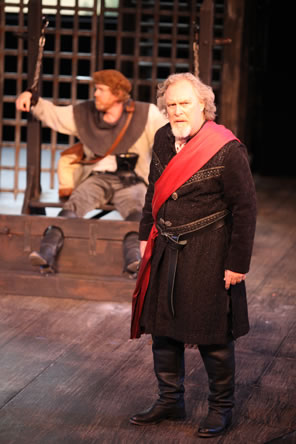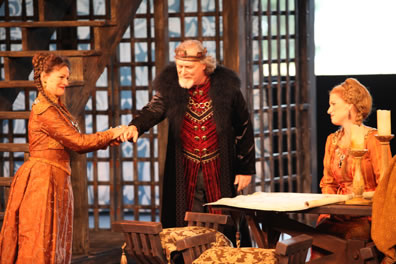King Lear
A Maddening King Lear
Bard on the Beach, BMO Mainstage, Vancouver, British Columbia
Saturday, August 15, 2015, Section 4, A–43 & 44 (front, center right section)
Directed by Dennis Garnhum

King Lear (Benedict Campbell) grows "mad" over his servant (the disguised Kent, played by John Murphy) being placed in the stocks in Bard on the Beach's production of Shakespeare's King Lear. Photo by David Blue, Bard on the Beach.
This is one, big happy kingdom. The three sisters, Goneril, Regan, and Cordelia, greet each other with delighted-to-see-you-after-so-long kisses. The two dukes, Albany (Goneril's husband) and Cornwall (Regan's husband), are convivial. The Fool jumps up on the banquet table and scatters confetti over Cordelia to the delight of all the company. France and Burgundy arrive, the former formal in bearing, the latter a smooth operator, as both do courtship to Cordelia while her sisters look on lovingly. The earls of Kent and Gloucester mingle with the family, Goneril and Regan chat amiably, and Cordelia sits at the table engaging in small talk with the two dukes.
It looks like a Disney fairy tale, but it's actually William Shakespeare's King Lear directed by Dennis Garnhum in a production first mounted by Theatre Calgary before moving to Vancouver's Bard on the Beach. Even Deitra Kalyn's vividly colored, richly appointed costuming has a once-upon-a-time look. You expect the fairy godmother to show up any moment; instead it's the bastard son, Edmund, who appears on the upper stage, benevolently watching all the family bliss.
He is the last addition to this introductory tableaux before you hear the first audibly spoken line, Kent asking Gloucester, "Is not this your son, my lord?" Note that this is not the first line Shakespeare wrote for King Lear. He starts with Kent and Gloucester talking obliquely about apparent discord and pending division in the family and then Kent inquires of Edmund. By combining the happy-family tableaux with the excision of the play's first six lines, Garnhum is setting the stage for a tragedy borne out of inexplicable chaos whereas Shakespeare was establishing the pre-existing seeds for chaos sown in human nature. From this thematic misstep, this production never fully recovers, and many character portrayals proceed on unsure footing.
The biggest stumble is the interpretation of Lear's madness by Benedict Campbell, who gives us a belligerent old fart as the title character. The definition of "mad" in his portrayal is evident in a bit of stage business when Lear says, "Do not make me mad" to Goneril and Campbell raises his hand ready to strike her. He's using mad as a synonym for anger, and these are the fits of "madness" we see from him as opposed to glimpses of insanity or senility. He engages in impatient blustering and seems ready to fistfight anything and everything: his daughters, his knights, the elements. The storm on the heath even punches back: with each crack of thunder and flash of lightning, Campbell stumbles back and forth across the stage as if on the receiving end of a left-right combo in an old John Wayne movie.
He keeps this demeanor in the hovel scene. Instead of Shakespeare's great composition of three-part mental illness with the senile Lear, the developmentally disabled Fool, and the hallucinating Poor Tom, we get Lear making angry assaults—sometimes physical—at anybody who gets in the way of his obessive imaginary revenge on his daughters. Campbell is much more gentle when the demented Lear appears in the Dover field and encounters the blind Gloucester (David Marr), but he reads this scene with such a cynical bent his Lear seems keenly aware of what he's saying and doing. I've seen some such cynicism by vagrant seers accosting people on D.C.'s streets and Metro trains, but Campbell isn't selling the inner storm of madness in his conversation with Gloucester; he's giving us prattling cleverness.
The net result is our disaffection. It's hard to feel for Campbell's Lear. When Regan (Jennifer Lines) tries to convince Lear to return to Goneril and finish his 30-day residency there, Lear retorts, "Ask her forgiveness?" Thereupon, Campbell turns sarcastic and engages in a clowning skit with the Fool (Scott Bellis), kneeling and saying, "Do you but mark how this becomes the house: 'Dear daughter, I confess that I am old; age is unnecessary: On my knees I beg that you'll vouchsafe me raiment, bed, and food.'" It's a buddy-buddy yuck-yucks show that prompts Regan to say, "Good sir, no more; these are unsightly tricks." She's right. Granted, the wording and punctuation in this passage validates such stage business, but in 14 previous Lears I've seen these lines are spoken by a Lear bewildered at his "loving" daughters' dereliction of their assigned and accepted duties. In the thematic arc of this production, playing this episode as it is done here only hastens our own growing impatience with Lear and further shifts our empathy toward his daughters.
Our shifting empathy becomes especially problematic with Goneril, thanks to Colleen Wheeler, who gives us a wonderfully conflicted reading of a woman who has a maniacal jerk for a father and a milquetoast of a husband, Albany (Declan O'Reilly). Throughout her interactions with her father, Wheeler's Goneril remains stoically stiff. In her face we can't tell if we see anger, indignation, or hurt. It is likely all of the above. Before Gloucester's trial, Goneril notably is the first to suggest plucking out his eyes, a line that erupts from Wheeler as a woman who can no longer bottle up her frustrations. From this point on, Goneril is anything but stoic: she hits on Edmund (Michael Blake), she goes toe-to-toe with Albany in their great scene of domestic hiss, and she ultimately poisons Regan in their rivalry over Edmund.
As for Cordelia (Andrea Rankin), her reunion scene with her dad rings hollow. Part of that is Campbell's Lear acting no more lost than he might upon waking up after a bad bender. Furthermore, because of the Lear we have seen from his first appearance on, while Cordelia might have "no cause" to do him wrong, she also has no cause to go to such great lengths (invading Britain with an army) to help him out. Her true motivations become further blurred in the next scene, in which the battle takes place on stage and we see the King of France (Craig Erickson) killed in combat. Whoa, wait a minute. France is noticeably absent from Shakespeare's play after he leaves with Cordelia upon her banishment in the first scene. When she returns in the fourth act, she is alone and says, "O dear father, it is thy business that I go about; therefore great France, my mourning and important tears hath pitied. No blown ambition doth our arms incite, but love, dear love, and our aged father's right." Shakespeare was being careful to contextualize the ancient tale of King Lear (who lived before there was a France) in social and personal strife, not civil and geopolitical conflict. This thematic misstep near the play's end further evidences a production missing the mark of Shakespeare's overall intentions.
Nevertheless, Garnhum does bring a keen directorial eye to some of the proceedings. As Gloucester reads the supposed letter from Edgar, Edmund, its true author, excitedly mouths along. When Edmund gets Edgar (Nathan Schmidt) to engage in a duel for appearances sake, Edgar shows himself especially good with a sword—even in a fake fight he nearly disarms Edmund. As he speaks his soliloquy leading to his transformation into the disguise of Poor Tom, Edgar is trying to hide from search teams. One pair of soldiers come upon him, and Edgar, staying within the lines of his speech, screeches, "Poor Turlygod! poor Tom!" The soldiers head off stage and Edgar turns back to the audience to speak the next line, "That's something yet," as confirmation that his disguise will work. "Edgar I nothing am." As Kent sits in the stocks, the letter he says he received from Cordelia is a scroll with blue ribbon; the letter from "friends" that Gloucester shows to Edmund is a scroll with blue ribbon: Same letter or perhaps an identifying code?
This production also has one of the grossest eye-gouging scenes you could ever see. After Cornwall wrenches out the first of Gloucester's eyes, he holds up the eyeball with its bloody optic nerve hanging down. Cornwall drops the eye on the floor and stomps on it. The second eyeball he squeezes in his fist, creating a gooey geyser of blood arcing across the stage.
That staging choice has turned off some patrons (and reportedly sickened others) for obvious reasons, but it is other staging choices I find more puzzling. When Gloucester arrives at the hovel to retrieve King Lear, Edgar as Poor Tom takes no note of his father. Even when Gloucester is recounting to the disguised Kent how his own beloved son betrayed him, Edgar/Tom remains out of earshot, huddled off to the side with Lear. Nothing in the text says Edgar has to hear these pronouncements, but Shakespeare, by inserting these lines at this moment, is providing a clue that the proximity of father and betrayed son should heighten the pathos of Edgar's situation. This production also retains the Fool's recitation of Merlin's prophecy. Shakespeare concludes the speech with an inside-theater joke—in history, Lear lived before Merlin, and Shakespeare acknowledges his own anachronism (a hint that he was really setting King Lear in contemporary Jacobean times). The attribution to Merlin is cut from Bellis' recitation of the prophesy, which might be no big deal, but he stays on stage as Edgar speaks his end-of-hovel soliloquy to the Fool rather than as a soliloquy. Schmidt also speaks the speech in Edgar's normal voice, not as Poor Tom, effectively revealing his true identity to the Fool. The Fool gives Edgar his coxcomb and marotte and leaves the play for good.

The protestation of love by Regan (Jennifer Lines, left) pleases Lear (Benedict Campbell) as Goneril (Colleen Wheeler) listens during Bard on the Beach's production of William Shakespeare's King Lear. Costumes by Deitra Kalyn. Photo by David Blue, Bard on the Beach.
With Lear compromised in our affection, this production spends its nearly three-hour run time looking for a tragic hero. It finally finds one in Kent. John Murphy plays the part with emotional resonance, a devotee of the king who displays a courageous sense of duty in the opening scene when he publicly checks the king's decision and behavior (this is a Lear who, in his anger, would rather kill Kent than merely banish him). Kent then comes back in the disguise of Caius to continue serving and protecting his king. When Lear dies, he does so quietly, peacefully, his head cradled in Kent's lap; the last act of Murphy's Kent is to guide his troubled monarch to a lasting, restful repose. "I have a journey, sir, shortly to go; my master calls me, I must not say no," Kent replies to Albany's proposal that Kent and Edgar jointly rule the country. We know what Kent means here, and Murphy speaks this line with a gravitas of great loss: loss of his king, loss of the man who has that in his countenance, "authority," that Kent would fain call master, loss of social order and, hence, loss of a reason for being.
Throughout this play, Kent is the voice of reason, the exemplar of duty, the champion of truth. And yet, his heroic efforts are overwhelmed. Garnhum assigns the fault to inexplicable fate. Shakespeare points the finger at us.
Eric Minton
September 20, 2015
Comment: e-mail editorial@shakespeareances.com
Start a discussion in the Bardroom



 Find additional Shakespeareances
Find additional Shakespeareances